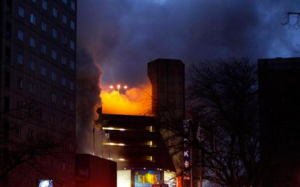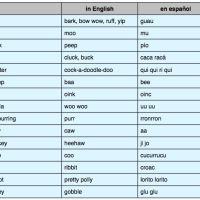Emergency!
March 20, 2012 2 Comments
Emergencies happen in every country and every language. It’s important to be prepared, so play this conversation game to practice giving instructions in an urgent situation.
1.Warm up. All the players introduce themselves, saying, “My name is ___ and I a dangerous part of my life is ___ because ____.”
My name is Alex and a dangerous part of my life is driving in the city because there are a lot of traffic accidents.
My name is Carly and a dangerous part of my life is my little brother because he likes to run and fight and break things.
2. Vocabulary generator. Do you recognize this picture? Not sure? If you can’t see much, there is a reason– this is a picture of the city of Boston during a blackout. On March 13th and 14th, the residents of Boston did not have power for many hours because of a fire. A blackout is when a large group of people lose electricity to their houses or businesses for a long period of time. Blackouts can cause traffic accidents, problems in hospitals, and an increase in crime. What other emergencies can you think of? Make a list. Here are some ideas:
earthquake
tsunami
thunder storm
hurricane
tornado
flood
fire
traffic accident
plane crash
terrorist attack
animal attack
epidemic of disease
riots
alien invasion
zombie attack
3. Grammar review: present perfect. Review how to use have/had and the past participle to talk about recent events, following this rule:
Subject + have + past participle
I have had an accident.
Aliens have invaded the planet.
Each student answers the question, “What is the most dangerous thing you have done?”
In pairs, the students interview each other about the emergency situations from the list.
Have you ever experienced an earthquake?
If yes: What happened? Where were you? What did you do? Did you get help from the police or the fire department? How has your life changed because of that dangerous situation?
If no: Do you think you will be in an earthquake in the future? Why? What should you do to be prepared? What should you do when an earthquake happens? What should you do after an earthquake?
5. Feedback. When most groups have talked about all the dangerous situations on the list, have a discussion in the larger group again. Ask each pair to share one thing that they talked about. Who in the class has experienced the most dangerous situation? Who in the class is the most prepared for an emergency?
6. Role-playing. Introduce the concept of 911. What phone number do you dial in an emergency? Put pairs of chairs back to back, similar to the telephone game. One partner is the victim of an emergency situation and the other partner is the 911 operator. The victim must report the emergency to the operator. The operator must ask the victim questions and try to keep the victim calm. The victim should describe the emergency in as much detail as possible, and the operator should give advice. Switch roles and repeat, then switch partners and repeat.
7. Global feedback. Ask the operators to talk about the most urgent situation they experienced in their role plays. How was the situation resolved? What should you do differently in real life?
Conversation objectives: Report an emergency, give commands, follow instructions, practice simple past and present perfect.
Ideal group size: Six to twelve people.
Ideal group level: Intermediate English.
This post is part of our March Conversation Marathon. We publish a new conversation activity every Tuesday and Thursday during the month of March. To see the complete list of Marathon activities, click here.
For more general conversation topics, click here. For more conversation games, click here.









¿Qué opinas?